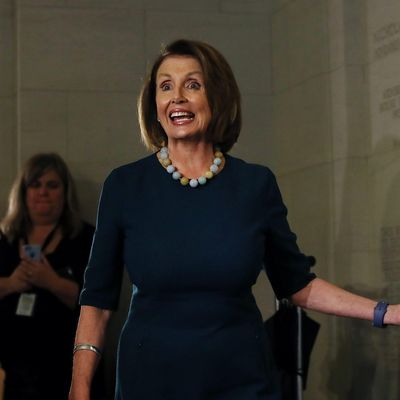
House Democratic Leader Nancy Pelosi has survived a leadership challenge from Representative Tim Ryan of Ohio by the margin of 134–63, accomplishing her self-defined goal of winning two-thirds of her caucus. The conventional wisdom in a political media environment eager for a Struggle for the Soul of the Democratic Party will almost certainly be that Ryan has exposed the weakness of the Democratic Establishment and perhaps the future ascendancy of “economic populists.” Ryan did, after all, make a more class-conscious economic message central to his platform as a candidate for the leadership, and he is, after all, from the very center of the Rust Belt revolt of white-working class voters against their former party. And Ryan did win 63 votes, more than any prior challenger to Pelosi, and benefited from a secret ballot that largely insulated caucus members from vengeful repercussions.
Any idea that the “populists” are poised for the conquest of the Donkey Party could be a bit premature, however. As the Washington Post’s Amber Phillips points out, there were plenty of nonideological reasons House members may have voted for Ryan, ranging from a simple desire for change in the wake of a disappointing election, to backbench restiveness toward the caucus seniority system, and inversely, senior members’ unhappiness with preemptive concessions Pelosi made to placate the young ‘uns.
Beyond that, Pelosi did win comfortably, which was not necessarily a given considering the rather one-sided debate Democrats have conducted since Election Day, with the populists led by Bernie Sanders and Elizabeth Warren riding high. One lesson may be that populist critics of the Democratic Party’s focus on identity politics have a real fight on their hands if they choose to go after gender pioneers like Pelosi with male alternatives — particularly if it appears that this will be a prescription for future Democratic presidential candidates.
But another alternative explanation is that a sizable majority of House Democrats think maintaining a unified opposition to Trump and the congressional GOP is the categorical imperative right now, instead of some recalibration of messaging aimed at a slice of the electorate in a slice of the country four years from now. It’s no secret that “economic populists” think “economic populism” is the answer to every political question, day in and day out, and in victory as well as defeat. The case that this is especially true right now will be met with some skepticism by many non–Rust Belt Democrats.
The challenge to Pelosi does raise an interesting question, however: With the defeat and probable retirement of Hillary Clinton, who is now the putative leader of the “non-populist” wing of the Democratic Party? Probably not Pelosi, considered a staunch progressive for most of her career. Probably not Chuck Schumer, who for the most part prefers to operate as an insider. Perhaps Barack Obama will stay sufficiently engaged in party politics to resist any Bernification of his party or repudiation of his own policy legacy, as his reported resistance to the idea of Keith Ellison as DNC Chair might suggest.
The future direction of the Democratic Party is as up in the air as Donald Trump’s own trajectory as president.






























